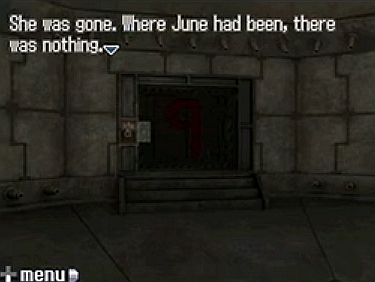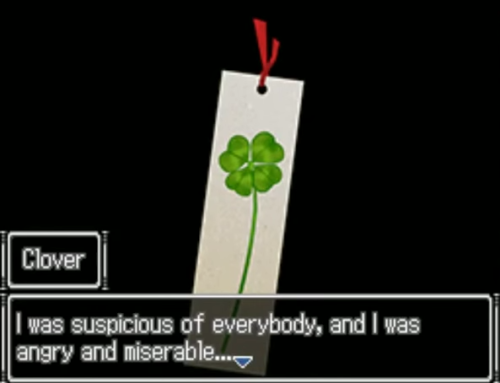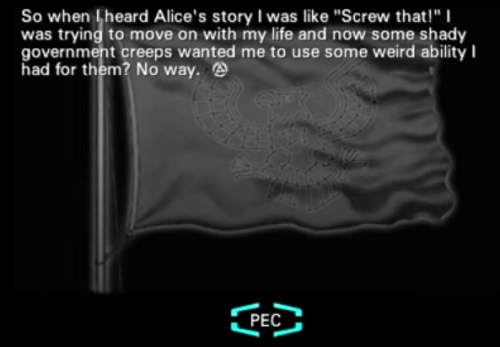Note: I originally posted this on Tumblr several years ago, where it seems to have been well-received. I'm reposting it here given Tumblr's uncertain future.

A while back, I translated this Famitsu interview Kotaro Uchikoshi gave right after 999's Japanese release to answer lingering player questions, and I was struck by the number of times that Uchikoshi chalks stuff up to "well, it had to happen that way because that's the way it was in the past." That sounds like a cop-out and, even with the game's Sheldrake fixation, it kinda is. After reading the 999 novelization (synopsis here) and mulling over the changes it made to the game's story, though, I began to look at these comments in a different light - they seemed to speak to a more psychological parallel reason behind the goings-on, one that dovetails with what the game has to say about violence.
Cutting for endgame 999 spoilers - right in the first sentence, so watch out! (Also, this essay refers to the DS version of 999, not the iOS or Steam/PS4/Vita versions.)
When I played 999, I was actually disappointed in the idea that Akane was Zero. I didn't buy it - Akane was, it then seemed, played up as such a fainting damsel and "lovable girlfriend" character in the game that I couldn't buy her as a bloodthirsty, calculating mastermind. Then the novel handed me a version of the story where Akane wasn't Zero, and it demonstrated how that idea didn't work - how Akane being Zero is central to the game's core theme.
The main thing that the novel loses in its portrayal of the Kurashikis (Akane in particular) is the game's commentary on how people are changed by trauma. It pervades 999 the game, though I didn't realize it until the novel took it away.
Now, we're all familiar with the mechanical significance of the morphogenetic field etc. in 999's scenario and how the plot hangs together "scientifically" and "logically," for Art Bell values of science and logic. Stories, though, often derive their power from how they map to more relatable, everyday touchstones in the human experience. So let's take a look at things from a symbolic perspective: what are Akane & Aoi trying to do by staging the new Nonary Game, basically? Recreate the circumstances of their past trauma and have things go right this time. The entire Sheldrake/Nonary Game setup, where a "repaired" echo of something in the present can rewrite the past, is a fictive equivalent of the coping tactic of replaying a distressing incident in one's head, except with a favorable outcome to make things better - Akane is trapped in the past in more ways than one. In the mental made literal, Akane and Aoi dedicate themselves (and others) to running through their trauma over and over again - except, given the device of the morphogenetic field, they actually can rewrite the past (or resolve the time paradox favorably, if you will) and get a good resolution on one of their runthroughs, if the conditions are right. The idea is that once this process is successfully completed, as is the hope with many therapies (even misguided ones), Akane will be able to self-actualize and move on - except here, given Akane's Schrödinger's cat situation, this self-actualization is painfully literal.
(This brings to mind the old observation* about how in good fantasy, the emotional needs of the characters and the themes of the story shape and determine the nature of the magic powers, instead of the powers being shaped by ornamental or other arbitrary considerations. It's no mistake that the particular brand of pseudoscience that drives 999's plot focuses on how the past influences the present in unseen ways, and how the past causes its own repetition and perpetuation.)

In these circumstances, the traditional happy ending would never work, as dealing with trauma doesn't result in an instant happy ending; you're just finally able to move on (as Akane, again very literally, does by driving away from the scene of her rehabilitation without additional entanglement). If we look at matters from the protagonist's perspective and priorities, though, there's another reason why Junpei can't have a happy ending: the Akane Junpei knew no longer exists. The violence visited upon her changed her and made her a different person. It's not a coincidence that once the player understands whom the current Akane really is by understanding the actions for which she's been responsible in the game, "June" disappears from the narrative in the current sense. There isn't any heartrending, revelatory confrontation or goodbye between her and the rest of the cast; she just totally ghosts. Akane narrates, and Junpei can communicate with past Akane, but "June" as we knew her throughout gameplay can't stay in the active narrative, as she's a conscious construct meant to reawaken Junpei's memory - a means to an end (and, perhaps in part, a role that allows Akane to enjoy for a few hours what might have been had things gone differently). June might have been an evolution of an Akane who existed before the Nonary Game - but the present Akane is no longer Junpei's Akane and hasn't been since the incident. June's total disappearance is meant to signal this definitive break.
Other details of the story of the participants in the first Nonary Game mirror those of real-life trauma victims in notably specific ways. They're not believed by the authorities (a depressingly common phenomenon with victimization), because their victimizer is in a position of prestige and power (ditto). What do Akane and Aoi want from their assailant? Not death, but a public acknowledgment of what he did to them. The vindication and validation of their account and feelings that they were previously denied - which only Ace can give them - mean more to them than obtaining vengeance through death (which they have no problem orchestrating for their ancillary tormentors).
Then we learn (in supplemental materials) that their assailant was himself brutalized in the same way and himself has been obsessed with reliving his past. He, however, has not even a morphogenetic plot reason for using the Nonary Game as the vector of his research; he does so only because he's mentally obsessed with it. He can't move on from his trauma and instead inflicts it upon others - a trait that defines those responsible for the misery in the story.

The cycle of violence is also acutely depicted in the two characters responsible for the game's most memorable acts of bloodshed: Snake and Clover. It's telling, and consistent, that out of the present-day Nonary Game's innocent targets, the characters who have previously been the direct victims of violence prove to be the ones most capable of violence themselves. Contrast this to Junpei, Seven, and Lotus, who are not direct victims of the Nonary Game from nine years past, at least not in the deeply traumatic manner of its helpless young test subjects: though Seven can play enforcer and Lotus and Junpei both attempt shady maneuvers involving doors, none wreak anything approaching the charnel of the Axe ending or the cavalcade of vengeful horror in the incinerator. (It's interesting to note that the most passive-victim ending, Sub, is experienced from the perspective of the Junpei-Seven-Lotus triad - who find out nothing and can only be slain as bystanders, swept up, symbolically, in a huge tableau of violence they can only view from outside and whose motives they don't understand at all.)
Snake and Clover, though, commit violence only in the relative heat of the moment, when the very worst is inflicted upon them unameliorated; their acts lack the long-term premeditation of the Kurashikis or Gentarou Hongou. Elsewhere in the game, they are used as a contrast, an alternative path - to emphasize the importance of a healthy response to trauma. Snake is the game's standout character, but why is he so remarkable, really? He has survived trauma - losing his sight - yet moved on to thrive in its aftermath. Small wonder, then, that he is one of the most capable players, the biggest help in negotiating the Kurashikis' miasma of personal pain; there's no question why, in the right path, he's Junpei's guide to unraveling this morass and not, say, something like the note in the safe. When he is absent, this task falls to his sister (and fellow trauma victim) Clover, and she will rise ably to it - provided she does not fall prey to the fresh horror inflicted on her. Given the themes of the game, it is no coincidence that a great deal of the path to the good ending in 999 involves ensuring that Clover doesn't let the fresh trauma of her brother's assumed death consume her. And who is responsible for the "hope, faith, love, and luck" mantra that greatly contributes to bringing Clover out of it (and helps the young abductees on the Gigantic in the first Nonary Game get through their ordeal)? Well, of course.
(It is noteworthy that while it is Aoi who first tells Junpei of the "Hope, Faith, Love, and Luck", he does so specifically in an act of repudiating it.)
(Note: VLR spoilers ahead.)

Now, I don't like 999's sequels at all; they have a markedly different attitude toward violence, embracing it Saw-style after the most perfunctory bits of hand-wringing. To me, 999 is a self-contained story. But I feel the few details we get of Snake and Clover's life decisions in Virtue's Last Reward, and the siblings' complete absence from Zero Time Dilemma, actually work as extensions of their function in 999's narrative.
VLR posits that after the events of 999, Clover and Snake were asked to join a secret organization supposedly dedicated to stopping a group of terrorists. (The specific branch they are asked to join is composed of their fellow first Nonary Game victims, headhunted for the same pseudo-psychic powers that got them selected for the game.) The organization is not under Akane's purview, but its cause is strongly identified with that of a group led by Akane. The Fields, however, refuse at first - as VLR Clover says, they want to "move on" with their lives; only when old friend Seven makes a personal appeal do they yield.
Snake and Clover's behavior may seem selfish, as the group's cause is on its face a noble one - and they are ultimately moved by it, after all - but I think, in a way, their initial resistance speaks to something good in the Fields: they decidedly do not want their past trauma to define them. They are reluctant to join a group that largely defines them by their role in the past Nonary Game (one that is, perhaps not coincidentally, largely ineffectual, as we hear of not one success in several missions; again, reviving old trauma proves to be a poor starting point for an endeavor). When their mother tries (understandably) to ensconce them in bodyguards in response to multiple kidnappings, they bolt to start their lives anew - and they succeed in carving out a niche for themselves, and are happy and fulfilled. The Fields are well-adjusted and have successfully moved past their trauma.
The Akane of VLR, however, has not fared as well - perhaps unsurprisingly given the method chosen for her salvation, her recovery has not taken, and she cannot move on from her past. Of all the infinitely more efficient options surely available to a woman of her talents and resources, Akane yet again resorts to a game of death and victimizing strangers to solve her problems; like Ace (another organizational head whose wealth and power should have afforded him better options than the path he took), she repeats the pattern of her past trauma, still mentally trapped by it. (Yes, VLR attributes the game to Klim, but Akane is the de facto mastermind.) Her recreation of her trauma continues right down to the separation of siblings with her potentially permanent separation of Clover from Snake, seemingly needless for any reason except obeying the dictates of her own ensnared mind. The parallels between Akane and Gentarou Hongou are even stronger and more striking here; she has become her victimizer, a role she fully embraces.
Akane's choices, though, are viewed by Virtue's Last Reward rather uncritically; the object of the game is (again) to save her, and she is held up as a patron saint of sorts, giving a benediction to Sigma and the player in a radiant green garden in the ending. This matches, however, the game's much more gleeful attitude toward hurting people; Akane's new Nonary Game is dramatically more vicious and nasty, encouraging players by design to backstab and murder - a task to which its cast rises, even to the detriment of its own self-interest, with downright stupid zeal. (Compare this to 999, which devoted oodles of dialogue, even for 999, to the Door 3-7-8 moral dilemma of leaving even one person behind - whereas the very title of Virtue's Last Reward states that ethics are for suckers.) Again, yes: Akane's actions are in the service of trying to stop a deadly global virus (in a bit of author overreach for his favorite character). But her approach to solving her problems does not speak well for her personal well-being, or to any continuity with the previous game's approach to trauma.
(These misplaced priorities, by the way, seep into VLR's portrayal of Clover (and every other VLR character); bluntly, Clover during the actual events of VLR is a fucked-up character because VLR and its priorities are fucked up.)
Then we arrive at Zero Time Dilemma, which is gleeful wall-to-wall violence, blood and guts and sadism for its own sake. Though Uchikoshi promised that the fate of Clover and Snake in the "real" timeline would be revealed in ZTD, the siblings merit not even a mention in the finished game - unlike, say, Lotus and Seven, who were markedly less central to the overall narrative. It makes sense that they are wholly absent here, spared not a thought by the plot or its participants: by ZTD, the series has given itself over to wholesale slaughter for its own sake, a celebration of pain rather than an examination of how to overcome it. There is simply no longer a place for what the Fields represent.
(*Note: The idea about the role of the supernatural in stories is expressed most memorably in screenwriter Todd Alcott's analysis of The Shining: "the requirements of the drama dictate the magical powers." I should have credited him initially. A warning: While hugely insightful, Alcott's series is from 2010, and as such demonstrates a dated lack of understanding of the dynamics in abusive relationships.) ↑

